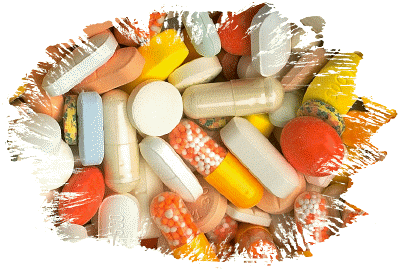
| Vitamin E Debate: Is Natural Better? |

| HealingWithNutrition.com 1-800-943-1123 | Home | SiteMap | Education | Products |
 |
|  |
|
You want to buy the best, but you've got lots of questions. Here's what you need to know
A wealth of research suggests that a daily vitamin E supplement of 100 to 400 international units(IU) may help you escape strokes and cataracts, ward off Alzheimer's disease, toughen your immune system, and fight prostate cancer and second heart attacks. No wonder so many experts take it! To help you find the best, here are your most asked questions---answered: Is natural vitamin E better for you than synthetic? The truth is, we don't know yet. We do know that natural vitamin E (extracted mostly from soybean oil) is taken up preferentially by your tissues--twice as much as synthetic vitamin E, a by-product of petroleum. But studies using both natural and synthetic E have shown health benefits. "The difference might or might not turn out to matter," says vitamin-E scientist Simin Meydani, PhD, of Tufts University in Boston. Still, some experts suspect that since natural E is preferred by the body, future research may prove that it produces a superior outcome. Based on this, Prevention now recommends natural vitamin E as your best bet, although synthetic E is clearly beneficial too. If synthetic E is half as potent as natural E, do I just need twice as much? Not quite. The unit of measure for vitamin E, the international unit, makes up some of the difference in potency---about 33% of it. To make up the rest, you need about two-thirds more synthetic E than natural E. For example, to equal the potency of 400 IU of natural E, you need to take 668 IU of synthetic E. Most vitamin E comes in multiples of 100 IU, so you won't be able to get an exact equivalent--just come as close as you can. What's the difference in price? Natural E can be more than twice as expensive as synthetic, but if you shop with a calculator you can find good deals. For example, we found Vitamin World synthetic vitamin E (100 softgel capsules of 400 IU) for $2.99, or .03 each; and Vitamin World natural vitamin E (250 softgel capsules of 400 IU) for $12.99, or .05 each. How can I tell which kind of E I'm buying? Never trust the word "natural" on the label; synthetic vitamin E is often labeled "natural" if it has even a little natural mixed in. The key to finding natural vitamin E is reading the ingredients list. For natural vitamin E, look for a form that begins with the term d-alpha. Synthetic E begins with the term dl-alpha.If the product has a blend of natural and synthetic, you should assume that it's mostly synthetic. If the label just says vitamin E, assume that it's all synthetic. Most multivitamins contain synthetic E. Can you get 400 IU of vitamin E from a good diet? No. To get your 400 IU, you'd need to drink more than 2 quarts of olive oil daily, one of the richest sources. Can vitamin E make your blood too thin? Don't take large doses of vitamin E if you're taking a prescription blood thinner such as Coumadin (warfarin) unless your doctor okays it. Vitamin E researcher Ishwarlal Jialal, MD, of the University of Texas Medical Center in Dallas, says that he becomes concerned when people on Coumadin take more than 800 IU of E. What about over-the-counter blood thinners such as aspirin, garlic, ginkgo, and fish oil? In a recent large study, Dr. Jialal says that there was no increased risk of bleeding found in people taking vitamin E, fish oils, and aspirin together. But the more you take, the greater the risk. So don't take megadoses. Vitamin E at a Glance Names: Natural forms include d-alpha-tocopherol, d-alpha-tocopheryl acetate and d-alpha-tocopheryl acid succinate. Synthetic forms include dl-alpha-tocopherol and dl-alpha-tocopheryl acetate. Benefits: Vitamin E may help prevent Alzheimer's disease, strokes, cataracts, prostate cancer, and second heart attacks, plus strengthen your immune system. Cost: We found Vitamin World synthetic vitamin E (100 softgel capsules of 400 international units [IU] each) for $2.99, or .03 each; and Vitamin World natural vitamin E (250 softgel capsules of 400 IU each for $12.99, or .05 each. Caution: Check with your doctor before taking vitamin E if you are on a prescription blood thinner such as Coumadin (warafarin). Taking vitamin E in combination with over-the-counter blood thinners such as aspirin and fish oil appears to be safe at moderate doses. Prevention Magazine, April 2000, "Vitamin E Debate: Is Natural Better?" pg. 73. |
|
Product Highlight: Ultra Body Toddy ($39.00), (32 ounces): Contains all natural Vitamin E along with 100 other nutrients for complete nutrient coverage. Ideal for active adults and those with extra nutritional needs. |
|
Product Highlight: Super E-Complex ($25), 250 Softgels: Super E-Complex contains a high quality, biologically active source of 100% natural vitamin E. Vitamin E is an antioxidant that is important in the prevention of cancer and cardiovascular disease. It also improves blood circulation, promotes healing, reduces scarring from some wounds, reduces blood pressure and aids in preventing cataracts. |
We welcome all Email!
©Copyright 1999-2001 Personal Health Lifestyles, Inc. All rights reserved.
Please read our Copyright and Legal Disclaimer.